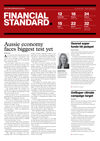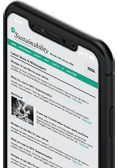ISSB looks to ease Scope 3 disclosure requirementsBY JAMIE WILLIAMSON | THURSDAY, 1 MAY 2025 8:35AMThe International Sustainability Standards Board has proposed changes to requirements under IFRS S2 to offer clarity around existing reliefs and provide further relief in relation to specific Greenhouse Gas emissions disclosures. Related News |
Editor's Choice
UN pension chief joins Northern Trust
The head of the United Nations Joint Staff Pension Fund is taking on a new role at Northern Trust Asset Management.
Podcast: Exploring emerging markets and sustainability
Pablo Berrutti, senior portfolio specialist at Stewart Investors, discusses emerging market investment opportunities and their main growth drivers.
Carbon emission stabilisation 'reframes' investment climate risk: Emmi
Latest modelling from Emmi indicates carbon emissions may plateau within the next two years before gradually declining, signalling the first ever emission stabilisation outside of an economic crisis.
Hollywood heavyweights call on pension fund to divest fossil fuels
The likes of Sally Field, Mark Ruffalo and Jane Fonda are calling on the SAG-Producers Pension Plan to dump its holdings in oil and gas companies.

















